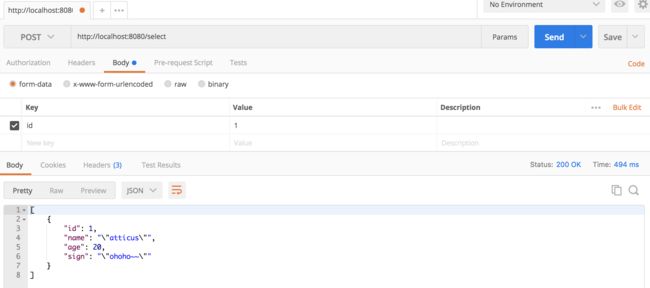Spring-Boot与MyBatis Generator
由于最近刚换工作,来了新项目之后发现技术栈和自己之前用的很多不一致,因此决定边学习边记录一下。今天看代码的时候发现很多文件里居然没有注释,还有大量的xml配置文件,瞬间感觉脑壳痛,仔细研究了一下才发现是自动生成的,囧~
今天就来记录一下Spring-Boot与MyBatis Generator的使用
1.简介
MyBatis Generator(MBG)的官方介绍在这里Introduction to MyBatis Generator,简而言之就是通过数据库的表结构来生成我们所需的代码,比如POJO与mapper等等。
2.环境
- 操作系统:macOS
- IDE:IntelliJ IDEA
- 数据库:mysql
3.创建工程
使用IDEA创建一个Spring-Boot项目是非常简单的,操作步骤如下:
点击Create New Project->Spring Initializr,选择SDK之后点击Next按钮,如下图:
之后更改
Group和
Artifact再点击
Next按钮
在弹出的界面中选中了
web选项(在这里也可以选中数据库之类的依赖,我在这里只选择了web,后续依赖都是自己加到
pom.xml中的),点击
Next按钮后再点击
Finish按钮即可。
创建出来的项目结构如下图所示:
- pom.xml是maven的配置文件
- SbootApplication是我们的启动类
- resources目录下的application.properties文件是我们的主配置文件,个人更喜欢yaml配置,所以把这个文件改为appl.yaml
4.引入依赖
详细的pom.xml配置内容如下:
4.0.0
com.atticus
sboot
0.0.1-SNAPSHOT
jar
sboot
Demo project for Spring Boot
org.springframework.boot
spring-boot-starter-parent
2.0.5.RELEASE
UTF-8
UTF-8
1.8
org.springframework.boot
spring-boot-starter-web
org.springframework.boot
spring-boot-starter-test
test
org.springframework.boot
spring-boot-starter-thymeleaf
org.mybatis.spring.boot
mybatis-spring-boot-starter
1.3.2
org.mybatis
mybatis
3.4.6
mysql
mysql-connector-java
8.0.12
org.springframework.boot
spring-boot-maven-plugin
org.mybatis.generator
mybatis-generator-maven-plugin
1.3.7
mysql
mysql-connector-java
8.0.12
我们导入了MyBatis Generator的Maven插件,在依赖下载完成之后,点开IDEA右边侧栏的Maven Projects标签,在Plugins下看到mybatis-generator即说明成功(若看不到,则点击左上角的刷新按钮),如下图所示。
5.准备数据库
进入mysql数据库,在attiicus库中创建一个students表:
CREATE TABLE `atticus`.`students` (
`id` INT NOT NULL,
`name` VARCHAR(45) NULL,
`age` INT NULL,
`sign` VARCHAR(45) NULL,
PRIMARY KEY (`id`));
6.配置generatorConfig.xml
在resources目录下新建generatorConfig.xml文件,具体内容如下:
需要注意以下几点:
- 数据库的连接地址,用户名,密码以及数据库名
- 生成配置所在的目录
- 需要生成的表名与类名的对应
配置保存好之后我们在右侧边栏中点击上文提到的mybatis-generator:generate按钮,等待生成后的文件如下:
一般来讲配置资源我们都放在resources目录下,因此将生成的map目录整个移动到resources目录下。
7.配置application.yaml
这是我们启动程序的主配置,内容如下:
mybatis:
mapper-locations: classpath:map/*.xml
type-aliases-package: com.atticus.sboot.model
spring:
datasource:
url: jdbc:mysql://127.0.0.1:3306/atticus?useUnicode=true&characterEncoding=utf-8
username: root
password: 123456
driverClassName: com.mysql.cj.jdbc.Driver
8.插入操作
首先在我们的SbootApplication类加上@MapperScan注解,代表要扫描这些包下的所有Mapper类,如果不在此加,也可以在每个Mapper类上加@Mapper注解。
package com.atticus.sboot;
import org.mybatis.spring.annotation.MapperScan;
import org.springframework.boot.SpringApplication;
import org.springframework.boot.autoconfigure.SpringBootApplication;
@MapperScan("com.atticus.sboot.mappers")
@SpringBootApplication
public class SbootApplication {
public static void main(String[] args) {
SpringApplication.run(SbootApplication.class, args);
}
}
在sboot下创建一个service包并建立一个MyService类
package com.atticus.sboot.service;
import com.atticus.sboot.mappers.StudentsMapper;
import com.atticus.sboot.model.Students;
import org.springframework.beans.factory.annotation.Autowired;
import org.springframework.stereotype.Service;
@Service
public class MyService {
@Autowired
StudentsMapper studentsMapper;
//插入单条数据
public int insert(Students students){
return studentsMapper.insert(students);
}
}
在sboot下创建一个controller包并建立一个MyController类
package com.atticus.sboot.controller;
import com.atticus.sboot.model.Students;
import com.atticus.sboot.service.MyService;
import org.springframework.beans.factory.annotation.Autowired;
import org.springframework.web.bind.annotation.RequestMapping;
import org.springframework.web.bind.annotation.RestController;
@RestController
public class MyController {
@Autowired
MyService myService;
@RequestMapping("/insert")
public int insert(Students students){
return myService.insert(students);
}
}
接下来启动当前应用,为了调试方便,我这里使用了Postman工具发送请求:
可以看到绿色框内返回了 1,代表请求成功,为了验证,我们查询一下数据库中的数据:
没有问题,这条数据成功插入了。那如果插入过程失败会如何呢,我们尝试把刚才的数据重复插入一次:
执行出错了,真正开发中我们会将返回数据格式化,并做统一的异常处理等,这里就不演示了。
9.查询操作
更改MyController类,添加一个查询方法
package com.atticus.sboot.controller;
import com.atticus.sboot.model.Students;
import com.atticus.sboot.service.MyService;
import org.springframework.beans.factory.annotation.Autowired;
import org.springframework.web.bind.annotation.RequestMapping;
import org.springframework.web.bind.annotation.RestController;
import java.util.List;
@RestController
public class MyController {
@Autowired
MyService myService;
@RequestMapping("/insert")
public int insert(Students students){
return myService.insert(students);
}
@RequestMapping("/select")
public List selectByExample(Integer id){
return myService.selectByExample(id);
}
}
然后更改MyService类
package com.atticus.sboot.service;
import com.atticus.sboot.mappers.StudentsMapper;
import com.atticus.sboot.model.Students;
import com.atticus.sboot.model.StudentsExample;
import org.springframework.beans.factory.annotation.Autowired;
import org.springframework.stereotype.Service;
import java.util.List;
@Service
public class MyService {
@Autowired
StudentsMapper studentsMapper;
//插入单条数据
public int insert(Students students){
return studentsMapper.insert(students);
}
public List selectByExample(Integer id){
StudentsExample studentsExample = new StudentsExample();
StudentsExample.Criteria criteria = studentsExample.createCriteria();
criteria.andIdEqualTo(id);
return studentsMapper.selectByExample(studentsExample);
}
}
重新启动应用,发送select请求,传入参数id:
正确的查询到了我们需要的结果。
10.总结
总体来说MyBatis Generator是一套很方便的工具,大大节省了开发时间,提高了开发效率,这里只是很简单的列出了使用方法,作为自己的一点记录。









